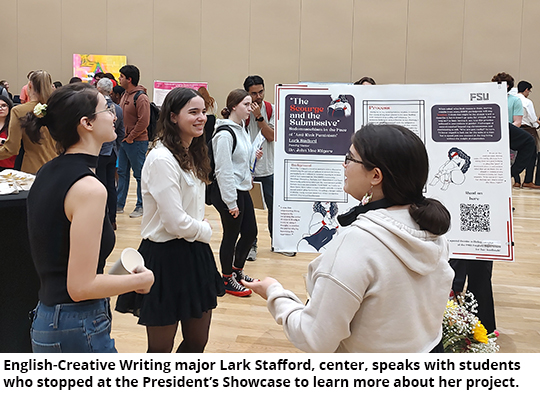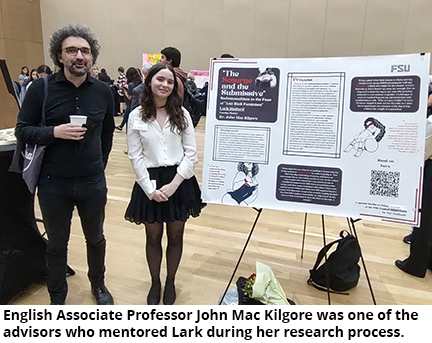English major Lark Stafford relies on her creative writing focus for inspiration to share her research topic at 2024 Showcase
By Jillian Kaplan
For Lark Stafford, the power of language goes beyond storytelling.
Stafford is a senior English-Creative Writing major with a minor in psychology at Florida State University, and she has long used the power of her writing to challenge the complexities of human intimacy.
Although she plans to specialize in sex therapy as a marriage and family therapist once she graduates from FSU, Stafford credits her English studies for much of the success she has had in her undergraduate research. This includes her recent poster presentation at the President’s Showcase of Undergraduate Research Excellence alongside fellow student researchers.
Stafford was selected in the spring of 2024 as one of FSU’s IDEA Grant recipients for the Summer 2024 semester. Her research, titled “The Scourge and the Submissive: Sadomasochism in the Face of Anti-Kink Feminism,” explores how social media shapes users’ perceptions of self and societal movements, particularly in relation to feminism and sexuality.
The radical topic critiques certain social movements, such as “choice feminism,” for potentially oversimplifying women's freedom within a patriarchal society, prompting Stafford’s critical reexaminations of the social structures women encounter. Stafford says she was fortunate to have the mentorship of English Associate Professor John Mac Kilgore and English-Creative Writing doctoral candidate Haley Laningham throughout the process.
In her work, Stafford delves into the nontraditional topic of kink, specifically sadomasochism and BDSM (bondage, discipline, sadism, and masochism). Stafford also addresses the criticisms from some feminist scholars, who Stafford argues perceive feminine submissives as undermining feminist ideals. Stafford points out that she is challenging the concept of “anti-kink feminism,” which, in her opinion, pressures women to justify their sexual identities, especially when these identities diverge from societal norms.
Stafford credits Laningham as being instrumental to her research process. She considers Laningham’s mentorship to be a significant source of inspiration for her work; Stafford took two courses with her prior to earning the IDEA Grant.
During the research process, the two met frequently on a bi-monthly basis to go through Stafford’s drafts in depth. Laningham’s guidance provided a critical role in offering Stafford’s research structure where necessary.
“Though her project may seem at first a shocking one, I can attest to the fact she is speaking into a robust field of personal study in the nonfiction field,” Laningham says. “Lark has researched and is aware of the lineage of writing on themes of sexuality.”
Laningham praises Stafford’s dedication to the work she accomplished throughout their long-term collaboration.
“Lark was a pleasure to work with and came prepared with extensive improvements to her draft at each of our meetings,” Laningham says. “We definitely strengthened our relationship as two women interested in producing writing about our experiences with sexuality.”
Kilgore says they helped to ensure Stafford considered the potential impact of her work on her audience, and they offered ways for her to adapt the  rhetoric accordingly. Kilgore became involved in Stafford’s research project after she took their Emily Dickinson class, where she explored questions similar to those she raised in her presentation relating to women's writing, sexuality, and queerness.
rhetoric accordingly. Kilgore became involved in Stafford’s research project after she took their Emily Dickinson class, where she explored questions similar to those she raised in her presentation relating to women's writing, sexuality, and queerness.
Kilgore’s role primarily involved providing moral support and helping Stafford think critically about her approach.
“Lark's very talented, very smart, and very confident, but I'm just thrilled she trusted me to be a mentor for this project,” Kilgore says. “She has a non-traditional topic, you might say.”
Reflecting on the past several months, Stafford emphasizes the importance that her creative writing background had on her research writing process. She attributes her studies as crucial in shaping her perspective on this sensitive subject and influencing her mental framework.
“I’ve always been of the opinion that creative writing is one of the best ways to share sensitive subjects like these,” Stafford says. “I read research papers for the basic mechanics, then creative literature for the humanity.”
Stafford adds that she finds creative writing to be a “vehicle” that gives meaning to any subject.
“I find it very difficult to connect to someone’s story when they feel like they have to adjust their language to make it more universal and ‘relatable,’” Stafford says.
After the arduous work was completed, Stafford was at last able to showcase her poster to the students and other campus community members in attendance at the showcase. As visitors continued to stop at her presentation, Stafford expressed, “I am certainly exhausted…I’m very, very tired.”
She was also deeply grateful for the experience and appreciated the critical engagement with her chosen subject. Read her Honors, Scholars, and Fellows House Blog post for more information about her experience leading up to the Showcase.
“Seeing how many people have talked about this presentation—regardless of what they take away from it—makes me very happy to know that my work can still affect people in such a way that it does here,” Stafford said, before turning back to speak with more people interested in her project.
Jillian Kaplan is a double major in English-Editing, Writing, and Media and in media communication studies. She also is the Views Editor for the FSView & Florida Flambeau.
Follow the English department on Instagram; on Facebook; and on X.
